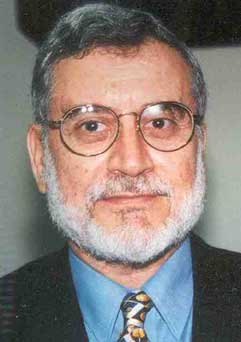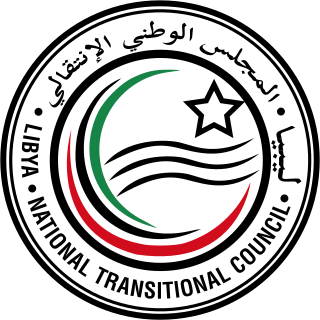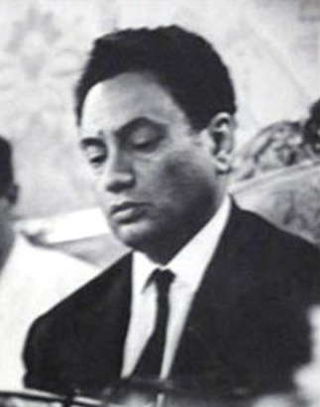This article needs additional citations for verification .(October 2019) |
| Type | Military Academy |
|---|---|
| Established | 1957 [1] |
| Location | , |
Benghazi Military University Academy is a military academy in Benghazi in Libya.
This article needs additional citations for verification .(October 2019) |
| Type | Military Academy |
|---|---|
| Established | 1957 [1] |
| Location | , |
Benghazi Military University Academy is a military academy in Benghazi in Libya.

Muammar Muhammad Abu Minyar al-Gaddafi was a Libyan revolutionary, politician and political theorist who ruled Libya from 1969 until his assassination by the NATO allied rebel forces in 2011. He came to power through a military coup, first becoming Revolutionary Chairman of the Libyan Arab Republic from 1969 to 1977 and then the 'Brotherly Leader' of the Great Socialist People's Libyan Arab Jamahiriya from 1977 to 2011. Initially ideologically committed to Arab nationalism and Nasserism, Gaddafi later ruled according to his own Third International Theory.

Baghdadi Ali Mahmudi is a Libyan politician who was Secretary of the General People's Committee of Libya from 5 March 2006 to as late as 1 September 2011, when he acknowledged the collapse of the GPCO and the ascendance of the National Transitional Council as a result of the Libyan Civil War. He has a medical degree, specialising in obstetrics and gynecology, and had served as Deputy Prime Minister to Prime Minister Shukri Ghanem since 2003 at the time he was appointed to replace him. He was a part of Gaddafi's inner circle at least prior to his escape in mid-2011. He was arrested in Tunisia for illegal border entry and jailed for six months, although this was later overruled on appeal, however a Tunisian court decided to extradite Mahmoudi to Libya under a request from Libya's Transitional Council.

Muammar Gaddafi became the de facto leader of Libya on 1 September 1969 after leading a group of young Libyan Army officers against King Idris I in a bloodless coup d'état. After the king had fled the country, the Revolutionary Command Council (RCC) headed by Gaddafi abolished the monarchy and the old constitution and established the Libyan Arab Republic, with the motto "freedom, socialism and unity". The name of Libya was changed several times during Gaddafi's tenure as leader. From 1969 to 1977, the name was the Libyan Arab Republic. In 1977, the name was changed to Socialist People's Libyan Arab Jamahiriya. Jamahiriya was a term coined by Gaddafi, usually translated as "state of the masses". The country was renamed again in 1986 as the Great Socialist People's Libyan Arab Jamahiriya, after the United States bombing that year.

Hussein Yousef Maziq a Libyan politician was Prime Minister of Libya from 20 March 1965 to 2 July 1967. He was one of the most important men in the Kingdom era of Libya.

The Kingdom of Libya, known as the United Kingdom of Libya from 1951 to 1963, was a constitutional monarchy in North Africa that came into existence upon independence on 24 December 1951 and lasted until a bloodless coup d'état on 1 September 1969. The coup, led by Muammar Gaddafi, overthrew King Idris and established the Libyan Arab Republic.

Ali Abdussalam Treki was a Libyan diplomat in Muammar Gaddafi's regime. Treki served as one of Libya's top diplomats from the 1970s till the 2011 Libyan Civil War. He was Minister of Foreign Affairs from 1976 to 1982 and again from 1984 to 1986, and was later the permanent representative to the United Nations on several occasions. He was the president of the United Nations General Assembly from September 2009 to September 2010.
Mansour Rashid Kikhia was the Libyan Minister of Foreign Affairs (1972–1973), Libyan Ambassador to the United Nations, Permanent Libyan Representative to the United Nations (1975–1980), and later an opposition figure to Libya's leader Muammar Gaddafi, and human rights activist.

The overall status of women in Libya has improved since the efforts of the Gaddafi government in the 1969 revolution. The same government has been held responsible for various human rights violations, including on women.Equal pay for equal work, universal healthcare, and the right to education have become state policy. Women have gained the right to vote, run for political office, and participate in national institutions. However, cultural biases against women in the workplace and resistance to change from traditional sectors of society have posed obstacles to process. Moreover, the political upheaval of the 2011 revolution has led to both gains and setbacks for women's rights. Nonetheless, the continued involvement and engagement of women in public life and government have emphasized the importance of female emancipation for the progress and development of Libya as a whole.

Ibrahim Abdulaziz Sahad is the Secretary General of the National Front for the Salvation of Libya (NFSL).

Mustafa Abdul Jalil is a Libyan politician who was the Chairman of the National Transitional Council from 5 March 2011 until its dissolution on 8 August 2012. This position meant he was de facto head of state during a transitional period after the fall of Muammar Gaddafi's government in the Libyan Civil War, and until the handover of power to the General National Congress.
The international reactions to the Libyan Civil War were the responses to the series of protests and military confrontations occurring in Libya against the government of Libya and its de facto head of state Muammar Gaddafi.

The National Transitional Council (NTC) was a transitional government established in the 2011 Libyan civil war. The rebel forces overthrew the Libyan Arab Jamahiriya of Muammar Gaddafi. The NTC governed Libya for a period of ten months after the end of the war, holding elections to a General National Congress on 7 July 2012, and handing power to the newly elected assembly on 8 August.

The foreign relations of Libya were largely reset at the end of the Libyan Civil War, with the overthrow of Muammar Gaddafi and the Second Libyan Civil War. The current Minister of Foreign Affairs since 15 March 2021 is Najla Mangoush. Although many foreign embassies in Tripoli closed down in 2014 due to the conflict in Libya from 2011 onwards, by the end of 2017 thirty diplomatic missions had reopened in the Libyan capital.

The aftermath of the 2011 Libyan civil war has been characterized by marked change in the social and political order of Libya after the overthrow and killing of Muammar Gaddafi in the civil war that was fought in Libya in 2011. The country has been subject to ongoing proliferation of weapons, Islamic insurgencies, sectarian violence, and lawlessness, with spillovers affecting neighboring countries including Mali.

The 1969 Libyan revolution, also known as the al-Fateh Revolution or 1 September Revolution, was a coup d'état and revolution carried out by the Free Officers Movement, a group of Arab nationalist and Nasserist officers in the Libyan Army, which overthrew the Senussi monarchy of King Idris I and resulted in the formation of the Libyan Arab Republic. The Free Officers Movement was led by Colonel Muammar Gaddafi.
The following lists events that happened during 2011 in Libya.

Ahmed Oun was a Major General in the Libyan Armed Forces. He was the head of Technical Affairs and Heavy weapons in the Ministry of Defense. In the late 2008 he was appointed as the Executive Secretary of the North African Regional Capabilities NARC by the North African Joint Chiefs, which is a part of the African Standby Force.

Libya–Spain relations are the bilateral and diplomatic relations between these two countries. Libya has an embassy in Madrid, and Spain has one in Tripoli.

Salah Masoud Busir was a Libyan politician, journalist, and historian. Born into a merchant family, he grew to have a successful career in journalism, politics, and science. He was an advocate for Arab values and for the independence of Libya from Italy. Busir was a strong opponent of first the Italian colonial occupation of Libya, and later the United Kingdom as well as the Libyan monarchy. As a result of this, he was forced to emigrate from Libya on two separate occasions. The 1969 Libyan coup d'état and subsequent coming to power of Muammar Gaddafi in 1969 allowed him to return from his 14-year exile. He became the first Foreign Minister of the Libyan Arab Republic and sought to eliminate foreign military bases in Libya. In 1972, he tried to promote his ideas at the pan-Arab level, but in February 1973, the plane on which he was flying was shot down by an Israeli fighter over the Sinai Peninsula.
Bashir Saghir Hawadi, also transliterated as Hawady or Houadi, is a Libyan major general who served under Muammar Gaddafi. He was among the twelve original members of the Libyan Revolutionary Command Council, and became the chief judge of the Libyan People's Court, and the General Secretary of the Arab Socialist Union.